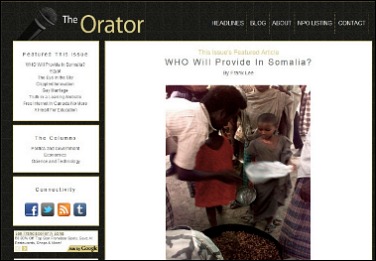 The Orator looks towards the future after first edition
The Orator looks towards the future after first edition
On March 17, The Orator launched its first edition—eight, full-length articles on current events, political topics, and pressing issues. The site got 1,200 hits in the first 24 hours.
It’s no blog. The Orator is an independent, online publication headed by junior Arif Hasan and staffed by eleven MVHS students. The purpose of the publication is to educate and inform teenagers specifically about the trials and tribulations of the world. Three categories make up the site: Politics and Government, Economics, and Science and Technology. “It’s important to be well-informed because our generation is honestly going to have to combat some of these issues in the future,” Hasan said.
As a new publication, The Orator has naturally encountered some bumps in the road with their first issue that they hope to improve on top of their goals for the future.  The topics that The Orator has covered span all over the globe, ranging from the uprising in Egypt to Canada’s tethered Internet. To avoid regurgitating news from other organizations, The Orator turns to non-profit organizations and non-governmental organizations, and other sources to use in their articles.
The topics that The Orator has covered span all over the globe, ranging from the uprising in Egypt to Canada’s tethered Internet. To avoid regurgitating news from other organizations, The Orator turns to non-profit organizations and non-governmental organizations, and other sources to use in their articles.
Hasan, who wrote a story titled “Egypt,” about the protests occurring there contacted a Stanford student who visited Egypt and had experienced the turmoil first-hand. On the other hand, not all interviews have gone quite as smoothly. Staff writer and junior Anirudh Kilambi attempted to contact several sociology professors. He got a response from one at San Jose State; however, the reply was limited. The Orator staff found that instances like this when contacting sources left them unable to write their stories. The staff had to help each other out to find sources and get into contact with them, slowing down the reporting process. Hasan hopes to rectify this problem.
“It involves doing a lot more comprehensive researching of sources, not just banking on ‘Oh, I’ll contact this person and if they reply, cool, and if not, then I’m stuck,” Hasan said.
Some experimentation with staff structure will occur with The Orator as it is just starting out. For the first issue, members were assigned a story and an opinion to go with the article. Then, the staff met together as a group for the editorial process.
Along with staff organization, the Orator will be exploring some political issues that many seem irrelevant or uninteresting for a teenage audience. The goal of The Orator is to convey current events in a way that is compelling to a high school audience while getting the big picture across. Hasan and Kilambi see The Orator as a fresh perspective on world events that larger news corporations are unable to offer.
“I feel like larger news organizations like CNN, for instance, can be a little too transient, a little too much on granule details,” Kilambi said.
In The Orator’s effort to broadcast the bigger picture, it hopes to expand into other more interactive mediums that will appeal to the younger audience.
Website designer and head of management junior Wells Santos hopes to see The Orator continue past the time when the staff will have graduated. When that will happen, the staff is not sure yet—but Hasan is looking to keep The Orator going, which leaves plenty of time for development.
Website designer and head of management junior Wells Santos hopes to see The Orator continue past the time when the staff will have graduated.
“Being able to keep this going even through college—it just makes it a lot less superficial rather than just making it for college,” Santos said.








